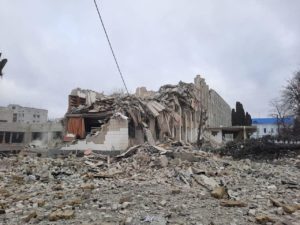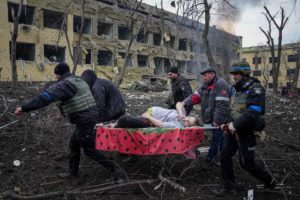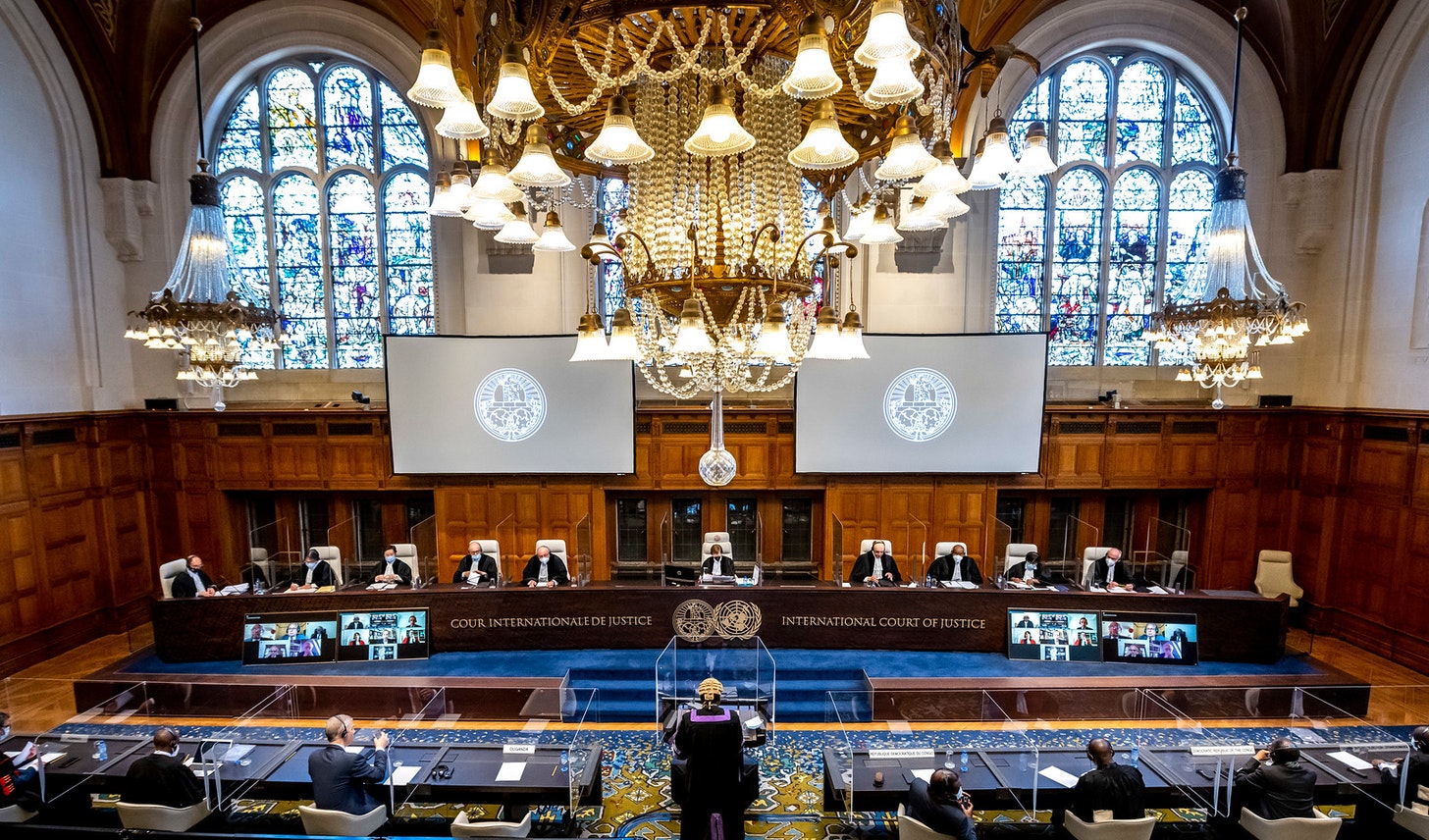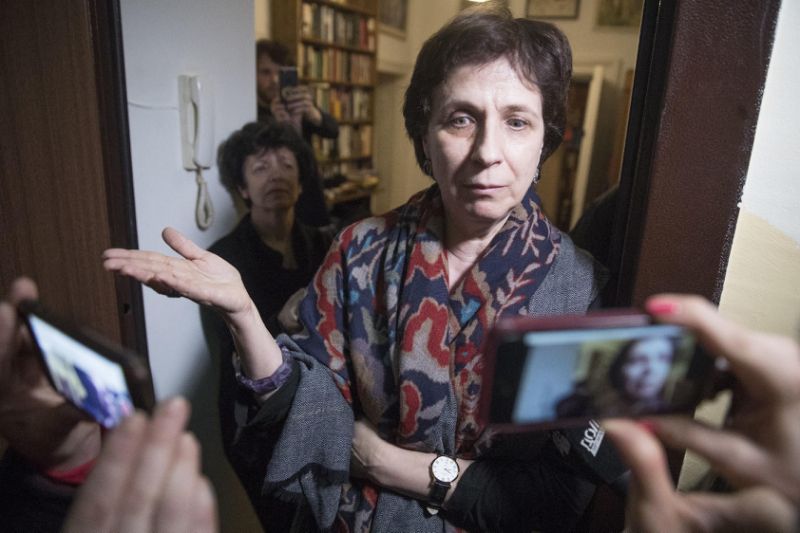"Putin lies, and Ukrainians, our citizens, die. It is not Ukraine who commits genocide, it is Russia and its political leadership and military personnel who commit crimes against humanity and war crimes on the territory of Ukraine." Here is what Ukraine said at the UN's top court, the International Court of Justice, where it lodged a case against Russia, seeking to “immediately suspend Russian military operations.”
ICJ examines Ukraine’s case regarding Russia’s false pretext of “genocide” to invade Ukraine
Opening Statement by Ukrainian representative Anton Korynevych
The Ukrainian delegation was led by Anton Korynevych, Permanent Representative of the President of Ukraine in the Autonomous Republic of Crimea, as Agent. Here is his Statement. Madam President, distinguished Members of the Court, it is a great honour to appear before you as the Agent of Ukraine. It is also a solemn responsibility. We are here today in this building called the Peace Palace but, at home, my country faces a war of aggression. I am standing here in a room called the Great Hall of Justice but, at home, my countrymen see only the injustice of Russia’s bombs and missiles falling on our cities and neighbourhoods. As I stand before the Court, Ukrainians are under deadly attacks. Millions of people are in imminent danger. The United Nations’ top human rights official warns that there are significant civilian casualties. Russia’s assault on Ukraine has prompted over one and a half million people to flee the country. Many more are internally displaced. More than 15,000 people, most of them women and children, have taken shelter in Kyiv’s subway tunnels4. Babies are born underground, there, in tunnels, and hospitals are being shelled. All of this is the dire reality the people of Ukraine face now. [...] This is, of course, not the first time that Ukraine has experienced first-hand Russia’s disrespect for international law. Now the world understands the depth of its disrespect and the height of its cruelty. The fact that Russia’s seats are empty speaks loudly. They are not here in this court of law. They are on a battlefield, waging aggressive war against my country. This is how Russia solves disputes. But Ukraine has another position and respects international law and this court of law. But even still, Russia knows that international law matters. Why else would Russia try to justify its aggression? This war, Russia says, is to stop a genocide. I quote Russia’s president from the morning he ordered the invasion of Ukraine. He said: “We had to stop that atrocity, that genocide. The ‘purpose’ of the war - he said - was to ‘protect’ people from ‘genocide’.” This is a horrible lie. Putin lies, and Ukrainians, our citizens, die. It is not Ukraine who commits genocide, it is Russia and its political leadership and military personnel who commit crimes against humanity and war crimes on the territory of Ukraine.
Kornychevych’s Statement was followed by presentations from Ukraine’s counsel, who explained why provisional measures are not only warranted, but vitally necessary.
Final Statement by Ukrainian representative Olena Zolotaryeva
In the end, Olena Zolotaryeva, Director, International Law Department, Ministry of Foreign Affairs of Ukraine, as Co-Agent; presented Ukraine’s final submissions. Madam President, distinguished Members of the Court, I am honoured to conclude Ukraine’s oral pleadings and make Ukraine’s final submissions regarding its urgent request for the indication of provisional measures. Ukraine has now faced 11 days of Russia’s brutal invasion of Ukraine. Many people said we could not withstand Russian aggression for so long. They underestimated the people of Ukraine. They underestimated our spirit, our unity, our devotion. Ukrainian heroes are bravely defending Ukraine - and we will keep defending Ukraine until the aggressor leaves. Ukraine is being supported by the civilized world. We are grateful to each and every act and effort to support Ukraine. But we need more help. We need more help from our allies. We need more help from every institution in the world. That includes this Court. Your power to act is clear. To defend actions that are indefensible, the Russian Federation fabricated allegations of genocide out of nothing. It used this horrible lie as a pretext for its unlawful assault on Ukraine. In doing so, Russia cynically abused the Genocide Convention. Russia twisted the crime of genocide to justify the crime of aggression. In the name of preventing and punishing the crime of genocide, Russia is committing war crimes and crimes against humanity. Ukraine has come here before you, the World Court, to seek urgent protection for everyone who lives in Ukraine. As Professor Thouvenin explained, there is no doubt of a legal dispute under the Genocide Convention. As Mr. Zionts showed, the reports of United Nations missions and other neutral observers confirm that Russia’s allegation of genocide is absurd. Marley Cheek demonstrated Ukraine’s right not to be illegally invaded based on a bad faith abuse of the Genocide Convention by Russia. Mr. Gimblett highlighted the extreme urgency of the situation. And Professor Koh explained why the Court can, and must, order the measures Ukraine requests. I could rest Ukraine’s case here. But at this difficult moment, I am compelled to remind the Court of the real, human stakes of Ukraine’s request. As I am speaking, the Russian Federation continues its relentless assault on our cities, on our towns, on our villages, on our people. This assault has taken many forms. My hometown of Kharkiv suffers for days from indiscriminate shelling but heroically resists. Churches are ruined; hospitals are ruined; universities are ruined; civil infrastructure is ruined there. None of these can be considered as legitimate military targets. The world is witnessing and documenting how Russia kills civilians in its indiscriminate attacks. We do not know yet the true number of Ukrainians that Russia has murdered in the past 11 days. We can only guess how many more will be murdered in the next 11 days, if this senseless aggression does not stop.
- The Russian Federation shall immediately suspend the military operations commenced on 24 February 2022 that have as their stated purpose and objective the prevention and punishment of a claimed genocide in the Luhansk and Donetsk Oblasts of Ukraine.
- The Russian Federation shall immediately ensure that any military or irregular armed units which may be directed or supported by it, as well as any organizations and persons which may be subject to its control, direction or influence, take no steps in furtherance of the military operations which have as their stated purpose and objective preventing or punishing Ukraine for committing genocide.
- The Russian Federation shall refrain from any action and shall provide assurances that no action is taken that may aggravate or extend the dispute that is the subject of this Application, or render this dispute more difficult to resolve.
- The Russian Federation shall provide a report to the Court on measures taken to implement the Court’s Order on Provisional Measures one week after such order and then on a regular basis to be fixed by the Court.





